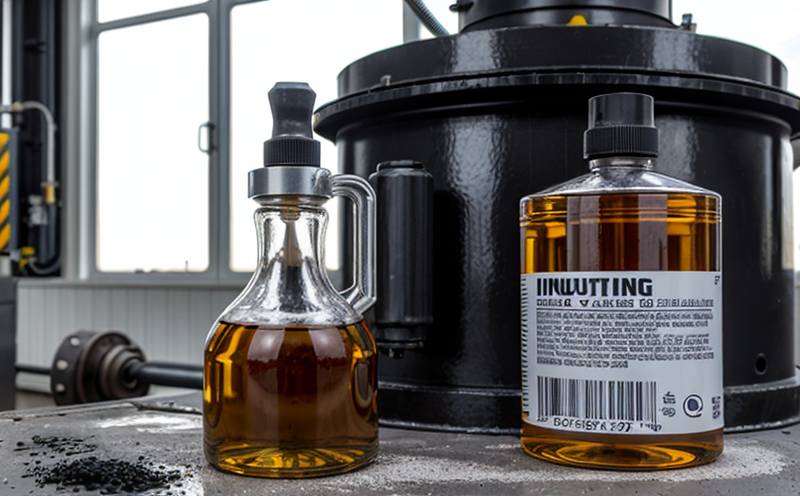ASTM D445 Viscosity Testing of Oils
The ASTM D445 Test Method is a widely recognized standard used to determine the viscosity of oils under refrigerated conditions. This test is crucial for ensuring that lubricants and other industrial fluids meet specific performance requirements at low temperatures, which can be critical in various industrial applications.
Viscosity plays a significant role in the efficiency, reliability, and longevity of machinery components. At low temperatures, many lubricants can thicken to the point where they no longer provide adequate protection against wear and tear. The ASTM D445 test ensures that these fluids maintain their appropriate viscosity range even when subjected to refrigeration.
The test involves measuring the kinematic viscosity of a sample at 100°F (37.8°C) and then comparing it with the same sample measured at -22°F (-30.6°C). The difference between these two viscosities provides valuable insights into the fluid's ability to perform effectively in cold environments.
The ASTM D445 standard is particularly important for industries that rely heavily on machinery operating under extreme conditions, such as refrigeration plants, power generation facilities, and marine engines. Ensuring that lubricants maintain their viscosity at low temperatures can extend equipment life, reduce maintenance costs, and enhance overall operational efficiency.
It's essential to note that the test procedure is precise and involves several steps:
- The sample must be degassed prior to testing to ensure accurate results.
- The sample is then transferred into a viscometer at 100°F (37.8°C).
- After the sample has settled, it is cooled to -22°F (-30.6°C) and held for an appropriate time to reach equilibrium.
- The kinematic viscosity of the sample is measured both before and after cooling.
This test provides a comprehensive evaluation of the fluid's behavior under extreme conditions, making it a valuable tool for quality assurance departments within manufacturing plants. By adhering to ASTM D445 standards, companies can ensure that their lubricants meet industry expectations and regulatory requirements.
The following table highlights some typical applications where this testing is essential:
| Industry | Application |
|---|---|
| Refrigeration | Ensuring proper lubrication of refrigerant compressors. |
| Power Generation | Maintaining optimal performance in turbine oils under cold conditions. |
| Marine Engineering | Guaranteeing that engine oils perform effectively even at low temperatures. |
The ASTM D445 test is just one part of a broader suite of quality control measures employed by laboratories to ensure the reliability and performance of industrial fluids. By integrating this testing into their processes, manufacturers can confidently meet regulatory requirements and improve product quality.
Applied Standards
The ASTM D445 test is part of a comprehensive set of standards designed to ensure the quality and performance of industrial fluids. In addition to ASTM D445, other relevant standards include:
- ASTM D1824: Standard Practice for Sample Preparation of Lubricating Oils.
- ISO 3104: Determination of kinematic viscosity by capillary viscometer.
- EN ISO 3104: Determination of kinematic viscosity by capillary viscometer.
- IEC 62598: Specification for lubricants and related fluids used in electrical equipment.
These standards provide a framework for testing various properties of industrial oils, including viscosity, flash point, pour point, and more. By adhering to these international standards, laboratories can ensure consistency and accuracy in their test results.
The ASTM D445 standard specifically addresses the unique challenge of measuring oil viscosities at low temperatures. It ensures that lubricants maintain their performance characteristics even when subjected to refrigeration or cold storage conditions. This is particularly important for applications where machinery operates under extreme environmental conditions, such as in polar regions or deep-sea environments.
By following these standards, laboratories can provide reliable and consistent test results that meet both industry and regulatory requirements. This helps manufacturers ensure that their products are safe, effective, and compliant with international regulations.
Benefits
- Enhanced Equipment Performance: Ensuring lubricants maintain their viscosity at low temperatures can significantly improve the performance of machinery. This leads to reduced wear and tear on components, extending the life of equipment.
- Economic Savings: By reducing maintenance costs associated with premature equipment failure, companies can save substantial amounts of money in the long run.
- Regulatory Compliance: Adhering to ASTM D445 and other relevant standards ensures that industrial fluids meet all necessary regulatory requirements. This reduces the risk of legal issues or fines.
- Better Product Quality: Consistent testing helps manufacturers produce high-quality lubricants that perform reliably under a wide range of conditions. This enhances customer satisfaction and brand reputation.
- Improved Efficiency: Ensuring that lubricants meet the necessary viscosity standards at low temperatures can improve overall operational efficiency, leading to better productivity and lower energy consumption.
The ASTM D445 test is just one component of a broader quality control process. By incorporating this testing into their workflows, manufacturers can ensure that their products are reliable, effective, and compliant with international standards.
Industry Applications
| Industry | Description of Application |
|---|---|
| Refrigeration Plants | Testing refrigerant compressor oils to ensure they maintain their viscosity at low temperatures. |
| Mining and Construction | Evaluating hydraulic fluids used in mining equipment and construction machinery to ensure they perform effectively under cold conditions. |
| Marine Engineering | Ensuring that engine oils maintain their performance characteristics even at low temperatures, which is critical for deep-sea operations. |
| Power Generation Facilities | Maintaining the efficiency of turbine oils used in power generation plants under cold conditions. |
The ASTM D445 test plays a crucial role in these applications by providing accurate and reliable data on oil viscosity. This information is essential for ensuring that machinery operates efficiently, safely, and economically. By adhering to this standard, manufacturers can ensure their products meet the stringent requirements of various industries.





